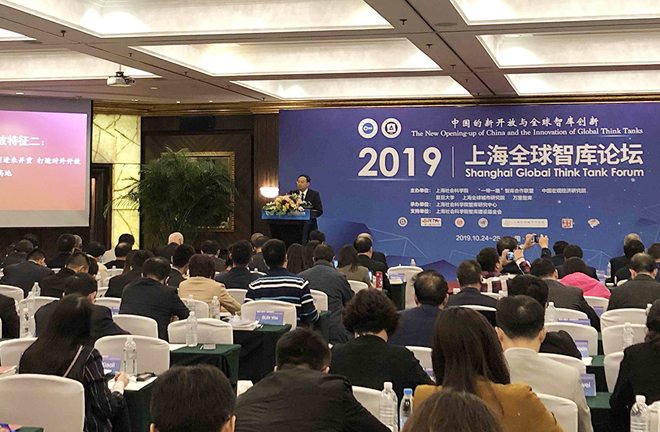Forum calls for innovation and global cooperation among think tanks

The recent 2019 Shanghai Global Think Tank Forum Photo: CAMR
SHANGHAI—Over 200 scholars from about 70 think tanks around the world attended the recent 2019 Shanghai Global Think Tank Forum. Think tanks are key to improving a country’s governance capacity. Countries all over the world are in dire need of professional think tanks, since governance in the contemporary world is becoming ever more complex and covers a wide range of industries.
Over the past 70 years, China has made remarkable socioeconomic achievements. Gao Peiyong, vice president of the Chinese Academy of Social Sciences (CASS), said that Chinese think tanks have made special contributions to these great achievements.
Gao observed that the building of Chinese think tanks over the past seven decades has shown three features. The first feature is practicality. Think tanks in China are set up and developed to solve the most practical problems facing China. Second, Chinese think tanks pay attention to the overall situation. The research done by think tanks and the respective resources they have been allocated all center on the development of China and the CPC. The third feature is professionalism. This requires scholars to have all received long-term professional training and to have been keeping up with studies in their field.
Gao pointed out that think tank construction and their research work should revolve around the goals of modernizing China’s governance system and improving its governance capability, so as to meet the requirements for the new era of socialism with Chinese characteristics.
Zhang Daogen, president of the Shanghai Academy of Social Sciences (SASS), said that the world is undergoing complex changes while global economic recovery still lacks momentum and regional hotspot issues continue to rise. The relationship between major economies has readjusted. New changes are taking place in international rules and regimes. The structure of global governance is going to be readjusted in a profound way. At this moment, think tanks must play their part and offer advice and suggestions as to the governance of the society, the country and the world.
Chen Zhimin, vice president of Fudan University, said that no matter how much domestic pressure a country faces, it should never back out of an already deeply globalized world. The only solution is to pursue inclusive growth. Opening up wider brings both opportunities and challenges, and that’s why global think tanks including the ones in China must conform to the trend of the times and contribute to global governance and innovation, so as to help develop the global economy and stabilize the international order.
New technology is influencing the future of mankind in a big way. Pan Jiaofeng, president of the Institutes of Science and Development at the Chinese Academy of Sciences, said that innovation is a revolutionary force driving forward the social and economic reform of the world. Meanwhile, fundamental changes are taking place inside innovative organizations. For instance, more key players have participated in innovative industries, organizations are opening wider to the public, crossborder cooperation has come into being, and sources of funding are expanding. These new features have made it possible for more innovative organizations to emerge such as shared labs and open platforms.
It is essential to enhance the capacity of think tanks. Sean Randolph, senior director of the Bay Area Council Economic Institute, advised that each scholar should follow a certain professional field for a long period of time, and they should keep close touch with such sectors as education and research and development. A professional think tank should be able to provide fundamental data analysis to decision-makers, who would then be more likely to make the right call based on evidence. Therefore, think tanks should ensure that the figures and reports they produce are credible, so that decision-makers in different fields can better locate the crux and solutions of the matters they are dealing with.
edited by WENG RONG

 PRINT
PRINT CLOSE
CLOSE